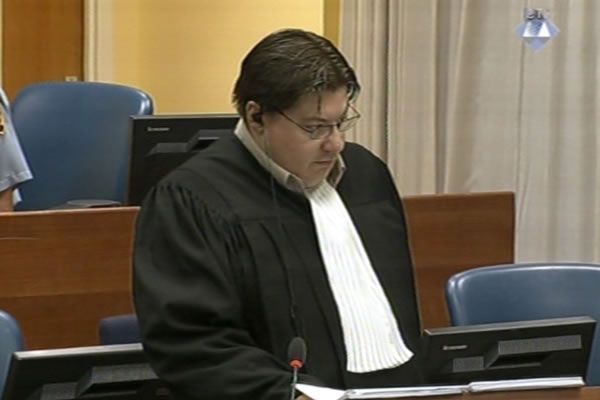Home
VRS DOCUMENTS CONFIRM AUTHENTICITY OF INTERCEPTED CONVERSATIONS
American intelligence officer Richard Butler dismissed the defense’s suggestion that the intercepted conversations of Ratko Mladic and his officers from the period before and after the fall of Srebrenica were not authentic. Butler noted that their contents corresponded to a great extent with the Bosnian Serb army documents as well as with the other evidence on the course of events leading to the Srebrenica genocide
 Dragan Ivetic, defence attorney of Ratko Mladic
Dragan Ivetic, defence attorney of Ratko Mladic In his reports on the course of the Srebrenica operation in July 1995, prosecution expert Richard Butler relied on the contents of the conversations of the Bosnian Serb military officers intercepted and recorded by the BH Army. This prompted Ratko Mladic’s defense counsel to contest the authenticity of the documents. The witness explained that in order to make his expert findings valid he had ‘looked into every nook and cranny’ and rigorously checked the possibility that they might be forgeries. He managed to confirm their authenticity.
The witness is convinced the intercepted conversations are authentic because their contents match the ‘wider context’: the actual course of events established on the basis of other evidence. For example, in an intercepted conversation someone says that 500 liters of fuel must be delivered to Vujadin Popovic, the Drina Corps security chief. The fuel was needed to move and bury the bodies of Srebrenica victims. Three years later, the reference to the fuel requisition was found in one of the seized VRS documents. As Butler said, for the BH Army soldiers to be able to fake the intercept, they would have had to sneak into the Bosnian Serb unit premises right after the fall of Srebrenica, while the mass executions were going in, read the relevant document and then incorporate the real facts into the fictitious intercepted conversation. After all the trouble, they could still not be certain that an investigation by the prosecutors from The Hague would actually unearth the document.
To sum up, the witness was convinced of the authenticity of the intercepts because the two warring sides – the BH Army in the intercepts and the VRS in its orders and reports –said the same thing about the same events.
When the defense noted that for the most part there were no audio recordings of the conversations, only the transcripts made by the Bosnian army technicians, the witness explained there had been a shortage of audio tapes. Defense counsel Dragan Ivetic tried to contest the credibility of the transcripts by highlighting the purported linguistic inconsistencies. In a conversation of 12 July 1995, Ratko Mladic said ‘we will evacuate everyone, those who want to leave and those who don’t want to go’, speaking about the civilians gathered in Potocari. The defense argued that the conversation was not authentic because the Serb general used the Croatian form of the word ‘evacuate’. Butler didn’t want to comment on the differences among the Yugoslav languages but argued in turn that a BH Army soldier who transcribed the conversation may have been a Croat.
As the cross-examination continued, the defense dealt with the witness’s conclusion that Mladic’s Directive 4 issued in August 1992 was not legitimate. One of the goals defined in the directive was to ‘force’ the enemy and the civilian population to ‘leave’ the enclaves in Eastern Bosnia. The defense counsel suggested that the idea was to ‘temporarily remove’ the civilians from the combat zone. The witness couldn’t confirm the suggestion.
Richard Butler’s evidence continues on Monday, and is expected to end on Tuesday.
Linked Reports
- Case : Mladic
- 2013-09-12 TESTIMONY ABOUT MLADIC’S ‘SHOCKING AND OFFENSIVE’ COMMENTS
- 2013-09-11 MLADIC BACK IN COURT
- 2013-09-10 TRIAL CHAMBER: ‘TRIAL CANNOT BE DELAYED BECAUSE MLADIC IS UNDER STRESS’
- 2013-09-16 ‘CARPET-BAGGERS’ WERE A LEGITIMATE MILITARY TARGET
- 2013-09-17 MILOVANOVIC AND MLADIC: TWO BODIES, ONE SOUL
- 2013-09-18 MILOVANOVIC: DIRECTIVE 7 WAS ILLEGAL
